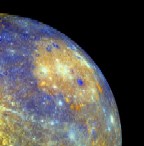
Messenger, a probe launched by NASA in August 2004, travelled close to the
planet Mercury for the first time this past January. Equipped with multiple
sensors, it collected its share of surprises for scientists.
One the one hand, the data have finally enabled scientists to resolve a debate
regarding the composition of the plains covering Mercury. The probe detected
volcanic activity. These plains are thus craters filled with lava.
Second, scientists have noted with amazement that Mercury has a magnetic field
similar to that of the Earth. This implies that Mercury is a planet with an
active core, and not a “dead” planet whose magnetism is a relic of the past (as
has very often been claimed by the scientific community).
Another “surprise”: Messenger made the very first observations of charged
particles in Mercury’s exosphere. Intense activity was detected, caused in large
part by solar radiation and winds.
A scientist involved in the project stated, “…thanks to Messenger, we perceive
that Mercury is a complex system and not just a ball of rock and metal.”
The leading lights of planetary science had always defended a vision of the
planet Mercury as an ordinary inert and dead rock in space. It was believed to
be pure stupidity to imagine that this rock could have any other action in the
solar system and in relation to the Earth than that of turning and wandering
fruitlessly, and sometimes appearing as a small point of light in the sky.
It is not a “surprise” now to observe that Mercury does not fit the
pre-established mould, that it is a sphere with a living, active magnetism,
interacting with the solar wind and, from that point on, with the solar system
itself!
The many “surprises” of the scientific world are more than surprises. They are
strong invalidations of misleading interpretations of the Real and its
subtleties that feed materialism. The “surprises” of the scientific world should
be accompanied by a recognition of the misuses of negative interpretations of
visions that recognize the system in which we exist as alive. These same leading
lights of a materialistic vision should also offer their apologies for having
maintained a false position, and promise to quickly acquire a healthy humility
and reserve so as to not exalt themselves in hasty and misleading
interpretations when knowledge appears so fragile and uncertain.